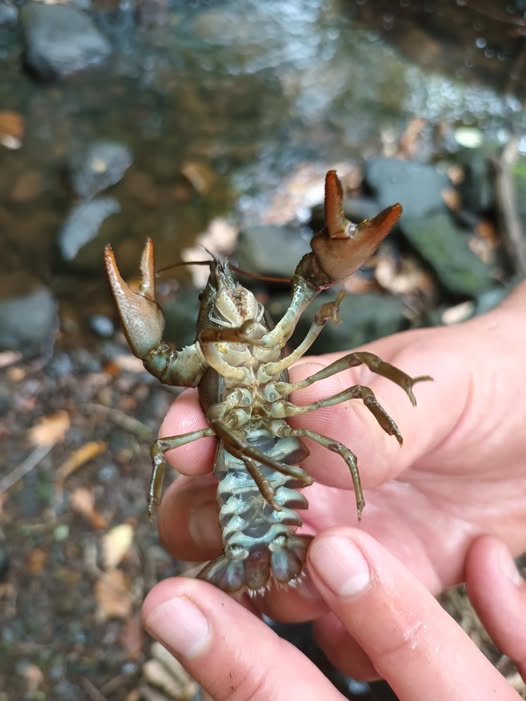
Part of a Calderdale nature reserve has been officially recognised as one of the borough’s most important sites for nature, thanks to its vital role in protecting the endangered white-clawed crayfish.
Jerusalem Farm is owned and managed by Calderdale Council and located between Halifax and Hebden Bridge in the beautiful Luddenden Valley. The Luddenden Brook, which runs through the site, has now been awarded Local Wildlife Site status, meaning it’s an area which is especially important for wildlife, supporting rare or threatened species and habitats.
The site is home to one of West Yorkshire’s last remaining populations of white-clawed crayfish. This threatened species is on the conservation red list, with numbers declining due to the introduction of the non-native North American signal crayfish. This invasive species is prevalent in many waterways in Calderdale, sadly spreading crayfish plague, a disease which kills the native white-clawed crayfish.
The new Local Wildlife Site status provides official protection to the crayfish species and the brook in which they live. As part of special efforts to protect them, biosecurity measures at the site are being increased, this includes putting up educational boards and providing special boot cleaning stations. This is being done with funding from Natural England and with support from the Environment Agency and Yorkshire Wildlife Trust.
The measures aim to stop the spread of crayfish plague, which can also be transferred on people’s clothing and boots. Visitors will be encouraged to ‘check, clean and dry’ their footwear and not to enter the brook at Jerusalem Farm.
The crayfish species is also being supported elsewhere in the borough, with other waterways in Calderdale being surveyed to establish ‘safe spots’ away from the invasive crayfish, where the white-clawed species could potentially be reintroduced.
The actions form part of the Calderdale Ecological Action Plan, which sets out the comprehensive and long-term approach to protecting and enhancing the borough’s natural environment for the benefit of present and future generations.
One of the key priorities in the plan is the protection of Calderdale’s wildlife, with the white- clawed crayfish identified as a particularly vulnerable species which requires specific conservation action.
Calderdale Council’s Cabinet Member for Climate Action and Housing, Cllr Scott Patient, said:
“As part of our Ecological Emergency Action Plan, we’re committed to doing all we can to protect the borough’s wildlife, with a particular focus on the most-threatened species.
“The white-clawed crayfish is sadly fast disappearing from the UK’s waterways, due to the threat of disease from non-native species. It’s vital that we protect the numbers that do remain, preventing them from further harm.
“Jerusalem Farm is one of the few places in West Yorkshire where the white-clawed crayfish can currently be found and I’m delighted that the Luddenden Brook, which runs through the site, has been granted Local Wildlife Status. This official status allows us to better protect this important habitat and helps to raise awareness of the plight of the native crayfish.”
To find out more about how to help with conservation, visit new.calderdale.gov.uk/environment/sustainability/conservation-advice(external link)
The Local Wildlife Site status complements the Calderdale Ecological Emergency Action Plan and its key theme of ‘Protecting Calderdale’s Wildlife’. Find out more at Calderdale Ecological Emergency Action Plan(external link)
